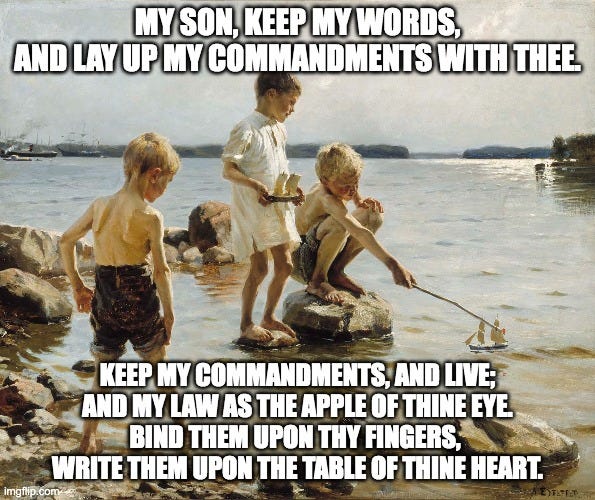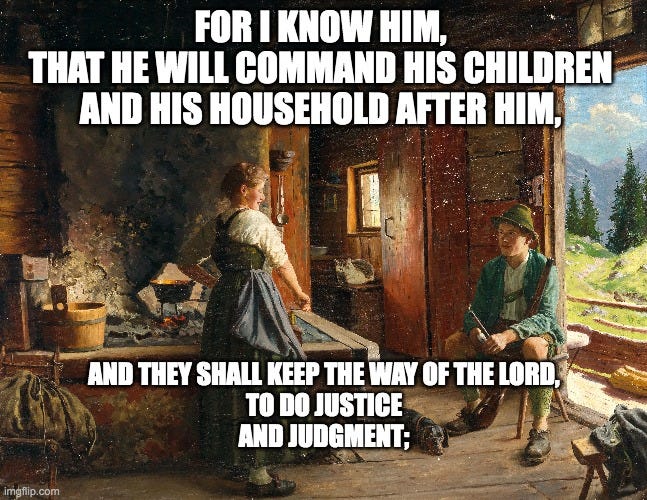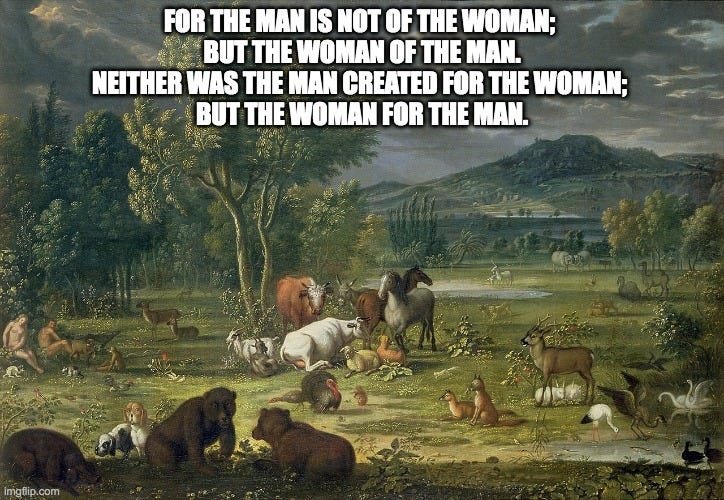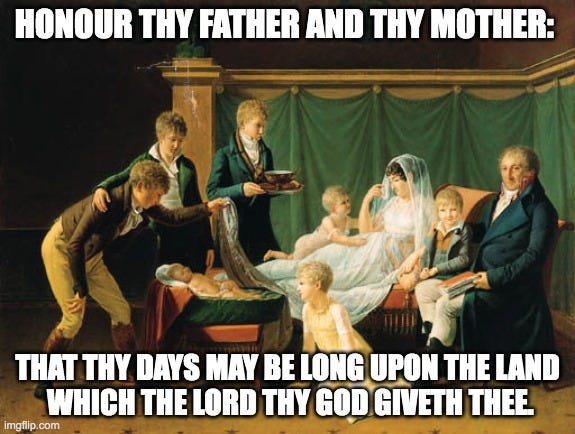Is there a difference in the Biblical authority of the father and the mother? Yes, much, in every way. Both have authority, but that authority is very different.
Introduction
Twice recently those I have been having discussions with have brought up the ‘mother’. When I have spoken about the authority of the father they have objected and said that I was leaving out the authority of the mother. I think I solved one of them when I pointed out that the particular post in question was actually answering a question literally about a father. So my answer focusing on the father was, well, on point.
However, a more serious issue has arisen recently. My good friend has written a very long post talking about the Rechabites and for some reason (it didn’t seem at all helpful to his argument1) he makes the following claim:
So, firstly, whatever it means to “honor” and “obey” our fathers must mean the same thing to “honor” and “obey” our mothers.
Cherry Picking
The first thing that I noticed about his list is that it is a rather dramatic example of cherry picking. If that is the right word. He finds several passages that speak of the authority of the father and the mother, and then concludes with, ‘See, they are the same!”
Well, not so fast. Just going over his list they are not exactly the same. Even many of the passages that speak of the authority of the mother and the father in the same breath often give them a slightly different slant.
But the real issue is that if you deliberately search for verses that speak of the mother and father’s authority, you will find them. They are in the Scriptures, and quite clearly so. But if you wanted to search for verses that speak only about the father’s authority, you would find them too.
In order to say they are ‘the same’, you would have to look at all of the verses, and compare what they say about the authority of each of them, the context, and how it works itself out in the Biblical stories and other teachings.
But just to show that two can play at that game, here are a bunch of verses that, if posted alone, would seem to show that only the father has authority:
Children’s children are the crown of old men; and the glory of children are their fathers.
Proverbs 17:6
A wise son heareth his father’s instruction: but a scorner heareth not rebuke.
Proverbs 13:1
My son, despise not the chastening of the LORD; neither be weary of his correction: For whom the LORD loveth he correcteth; even as a father the son in whom he delighteth.
Proverbs 13:11-12
Hear, ye children, the instruction of a father, and attend to know understanding. 2For I give you good doctrine, forsake ye not my law.
Proverbs 4:1
Then Laban and Bethuel answered and said, The thing proceedeth from the LORD: we cannot speak unto thee bad or good.
Behold, Rebekah is before thee, take her, and go, and let her be thy master's son's wife, as the LORD hath spoken.
Genesis 24:50-51
Statistics
Abraham begat Isaac; and Isaac begat Jacob; and Jacob begat Judas and his brethren;
And Judas begat Phares and Zara of Thamar; and Phares begat Esrom; and Esrom begat Aram;
And Aram begat Aminadab; and Aminadab begat Naasson; and Naasson begat Salmon;
And Salmon begat Booz of Rachab; and Booz begat Obed of Ruth; and Obed begat Jesse;
And Jesse begat David the king; and David the king begat Solomon of her that had been the wife of Urias;
Matthew 1:2-6
And then we could talk about statistics. The number of times the word ‘father’ is used, vs the number or time the word ‘mother’ is used, for example: 1126 times vs 320.
Or the term fatherless vs motherless, which is 43 to zero.
Let us examine the genealogies. Both mothers and fathers appear in the genealogies, at the rate of about 25 to one in favour of fathers.
Then we could look at the stories, and see the dozens of times that sons are shown obeying their fathers in the story, and compare that with the comparatively few times they are shown obeying their mother.
The Name ‘Father’ in Scripture
And I looked, and, lo, a Lamb stood on the mount Sion, and with him an hundred forty and four thousand, having his Father's name written in their foreheads.
Revelation 14:1
But while that would not be a useless study in Scripture, since each word of Scripture is meaningful, what we really need to do is to see the way the words ‘father’ and ‘mother’ are used in Scripture. Let us start with the word, and concept, of ‘father’.
God the Father
Ye do the deeds of your father. Then said they to him, We be not born of fornication; we have one Father, even God.
Jesus said unto them, If God were your Father, ye would love me: for I proceeded forth and came from God; neither came I of myself, but he sent me.
John 8:41-42
The most obvious observation to make is that God is called by the term ‘father’. Christ Himself makes that abundantly clear. While there are a few times where God, in metaphor, is presented in some ways as mother, He is often and openly represented as a father. He is also represented as husband, and king, but the most open and repeated relationship word used for God (Other than, ‘God’ itself) is ‘father’.
God of your Father
Moreover he said, I am the God of thy father, the God of Abraham, the God of Isaac, and the God of Jacob. And Moses hid his face; for he was afraid to look upon God.
Exodus 3:6
And then we need to look at the passages which speak of ‘your father’s god’ or a similar phrase. I did a diligent search, and I’m not saying it doesn’t exist, but I didn’t find any passages which spoke of ‘the god of thy mother’, and I found dozens which spoke of ‘the god of thy father’.
Works of your Father
They answered and said unto him, Abraham is our father. Jesus saith unto them, If ye were Abraham's children, ye would do the works of Abraham.
But now ye seek to kill me, a man that hath told you the truth, which I have heard of God: this did not Abraham.
John 8:39-40
It would take a lot of digital ink to lay out all of the stories in the Scriptures where a given character is compared, often negatively, to his father. So and so did not do the works of his father David, is a frequent comparison in the books about the kings.
Or that a son is punished or kept from punishment because of the works of his father, and his relationship with God.
The Authority of the Mother is Subordinate Authority
Moreover thou shalt provide out of all the people able men, such as fear God, men of truth, hating covetousness; and place such over them, to be rulers of thousands, and rulers of hundreds, rulers of fifties, and rulers of tens:
And let them judge the people at all seasons: and it shall be, that every great matter they shall bring unto thee, but every small matter they shall judge: so shall it be easier for thyself, and they shall bear the burden with thee.
Exodus 18:21-22
A lot of the difference between the authority of the father and the authority of the mother is explained, in my opinion, by noting that the authority of the mother is a subordinate authority. She is under the authority of her husband. Thus at her best when she exercises her authority it is to do the will of her husband… the father.
The issue of subordinate authorities is one that very much comes up in the original post, so I will be dealing with it later. A quick overview of the concept is that all authorities act under other authorities, and the exercise of their authority is designed to do the will of the higher authority.
Conclusion
There is a generation that curseth their father, and doth not bless their mother.
Proverbs 30:11
Time and time again. And time and time again, the Scriptures elevate the authority of the father. While not at all ignoring the mother, she is not brought to prominence. And the story of Jonadab, the son of Rechab, which the original post was about… is the story of a father. A long dead great… grandfather who gave commands to his children, and whom his children were still obeying 300 or so years late. And whose obedience… God praised.
Thank you for reading Von’s Substack. I would love it if you commented! I love hearing from readers, especially critical comments. I would love to start more letter exchanges, so if there’s a subject you’re interested in, get writing and tag me!
Being ‘restacked’ and mentioned in ‘notes’ is very important for lesser-known stacks so… feel free! I’m semi-retired and write as a ministry (and for fun) so you don’t need to feel guilty you aren’t paying for anything, but if you enjoy my writing (even if you dramatically disagree with it), then restack, please! Or mention me in one of your own posts.
If I don’t write you back it is almost certain that I didn’t see it, so please feel free to comment and link to your post. Or if you just think I would be interested in your post!
If you get lost, check out my ‘Table of Contents’ which I try to keep up to date.
Von also writes as ‘Arthur Yeomans’. Under that name he writes children’s, YA, and adult fiction from a Christian perspective. His books are published by Wise Path Books and include the children’s/YA books:
The Bobtails meet the Preacher’s Kid
and
As well as GK Chesterton’s wonderful book, “What’s Wrong with the World”, for which ‘Arthur’ wrote most of the annotations.
Arthur also has a substack, and a website.
Thanks again, God Bless, Soli Deo gloria,
Von
The post was literally talking about the authority of a specific father. There was no mother mentioned, let alone one that tried to put her authority against that of the father. Thus whether the mother had the same authority, lesser authority, or no authority at all would not have affected anything about the interpretation of the passage, as far as I can see. So, a bit of a Red Herring to the issue of the Rechabites. But an interesting one.











Some verses that list Father and mother as having authority but using different words for father and mother’s authority
Proverbs 1:8-9
8My son, hear the instruction of thy father, and forsake not the law of thy mother: 9For they shall be an ornament of grace unto thy head, and chains about thy neck
Proverbs 6
20¶My son, keep thy father’s commandment, and forsake not the law of thy mother: 21Bind them continually upon thine heart, and tie them about thy neck. 22When thou goest, it shall lead thee; when thou sleepest, it shall keep thee; and when thou awakest, it shall talk with thee. 23For the commandment is a lamp; and the law is light; and reproofs of instruction are the way of life: